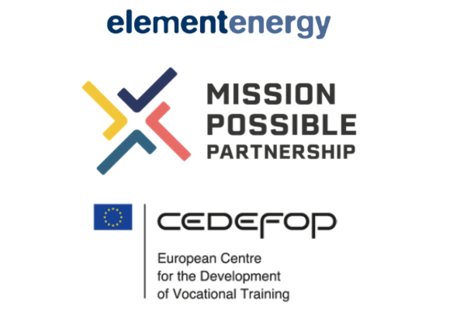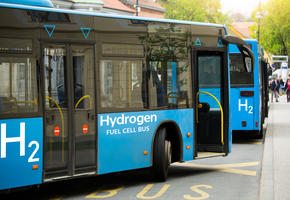Industry experts joined governments participating in our Industry Transition Platform for a three-day virtual workshop to explore potential policy solutions available to subnational governments to support industry emissions reductions.
During the workshop, held in collaboration with systems change experts Edge Effects, the project participants came together to present and discuss key considerations and policies based around three core topics:
- Carbon capture and utilisation (CCU)
- Green public procurement
- Green skills development
The Industry Transition Platform is a joint project of the Climate Group and the German state government of North Rhine Westphalia, funded by Stiftung Mercator. The project works with governments from highly industrialised regions to develop strategies to cut industry emissions, while supporting growth, job creation and prosperity.
Over the three days, the governments were provided a space to receive expert advice on key considerations for each potential policy option; to share and discuss their current thinking, experiences and what other governments are doing in each policy area; and to reconnect and support each other’s learning and industry transition development.

On Day One of the workshop, low carbon energy consultants Element Energy, presented the research they had conducted for the Industry Transition Platform participants on carbon capture and utilisation (CCU), titled: CO2 Utilisation Options for Regional Development. The research supplements the knowledge of CCU options for subnational government participants and provides insight into the opportunities which exist for CCU to be part of regional industrial decarbonisation plans and strategies.
During the session, experts from Element Energy presented and facilitated discussions on three key areas of the research:
- CO2 utilisation pathways technologies and products
- Barriers and enablers for CO2 utilisation
- Regional adoption of CO2 utilisation
On Day Two, the governments were joined by the Mission Possible Partnership, including Faustine Delasalle, Co-Executive Director, who presented on the opportunities for subnational governments to use green public procurement to shift to low-carbon materials, especially in buildings. In order to avoid lock-in of high carbon assets, deployment of low-CO2 technologies needs to start in the 2020s, and by using public procurement subnational governments can shift demands from high-carbon to low-carbon assets.
She highlighted that subnational governments can show their support for low-carbon materials to drive market pick-up through three signals:
- Direct offtake agreement - e.g. setting a public tender for an offtake of a certain volume of low-CO2 steel for a particular project.
- Future purchase commitment - e.g. public announcement on intention to purchase a certain quantity of breakthrough steel (absolute value of percentage) as part of total procurement contracts through targeted incentives.
- Indirect signal - e.g. commitment to reduce lifecycle emissions of new public buildings and infrastructure via implementation of new CO2 emissions criteria in procurement rules.
On Day Three, Joanna Napierala, an Expert in Labour Markets and Skills Research at Cedefop, the European Centre for the Development of Vocational Training joined the workshop and first explained how green skills were identified:
- Focus on process (e.g. jobs related to waste management, waste treatment, energy use monitoring)
- Focus on product (e.g. jobs related to products such as hybrid or electric automobiles, insulation products or energy monitoring systems)
- Focus on industry (e.g. manufacturing of energy efficient appliances, filters or wind turbines)
- Focus on occupation
Joanna then shared the similarities between brown and green skills, the potential for overlap that exists, and how this overlap can be used to bring people from brown jobs to green jobs as part of the industry transition. She also outlined ways that policies can help overcome barriers to participation. For example: if a barrier is access, providing outreach information, guidance, and delivery.
Next steps
During the final months of the project, participants will take part in additional workshops and webinars. Governments will learn from each other and case studies will be developed to showcase the participating governments’ industry transition strategies to inspire other Under2 Coalition members.
The Industry Transition Platform will be hosting a virtual site visit and webinar on Thursday 10 June at 4pm BST on the successful cap-and-trade scheme by the Government of Québec – highlighting new developments and Québec’s 2030 Green Economy Plan to accelerate green investments. Register and find out more by clicking here.
CO2 utilisation options for regional development.pdf
Size: 1.23 MB
Date added: 10/05/21

